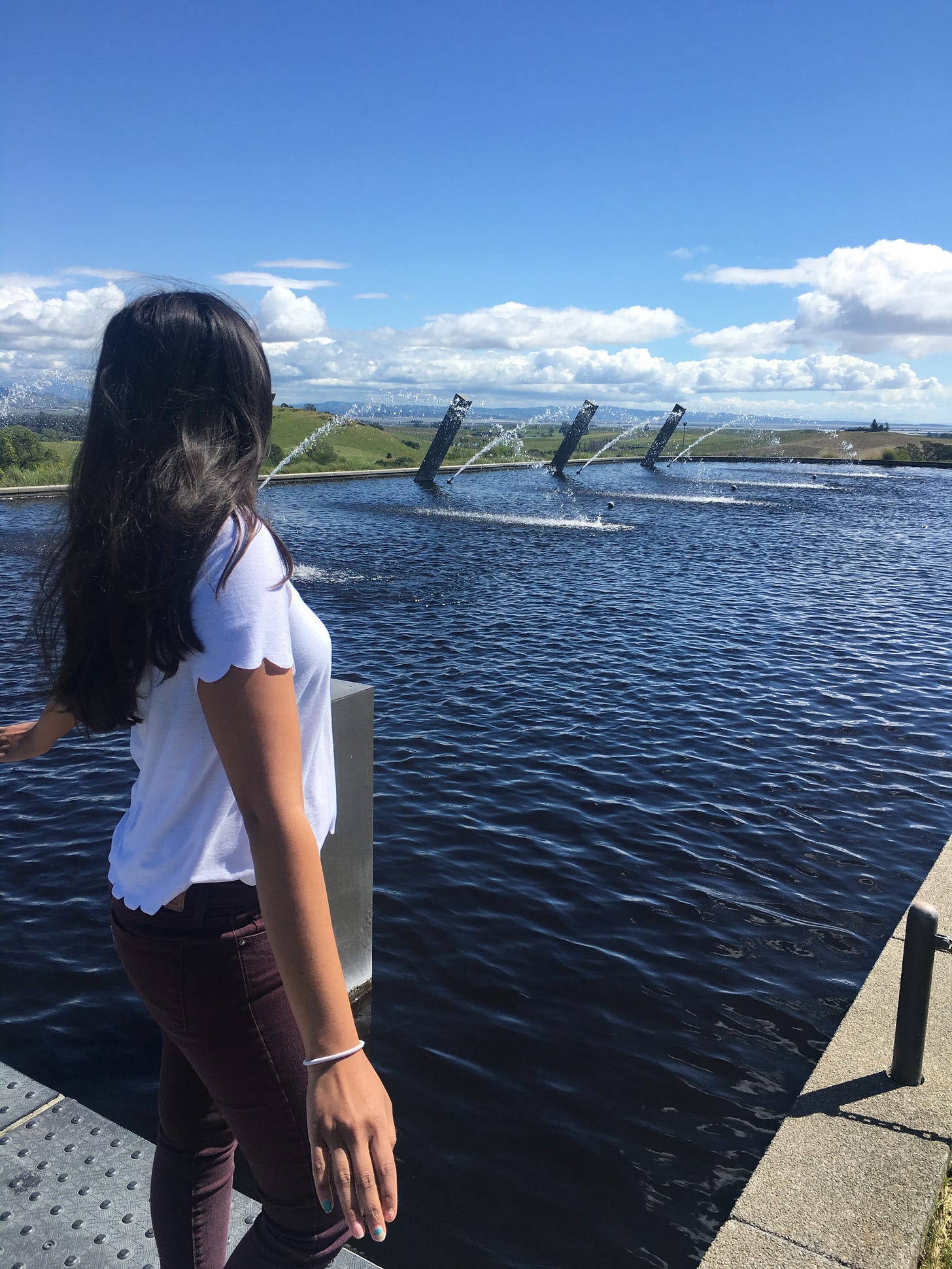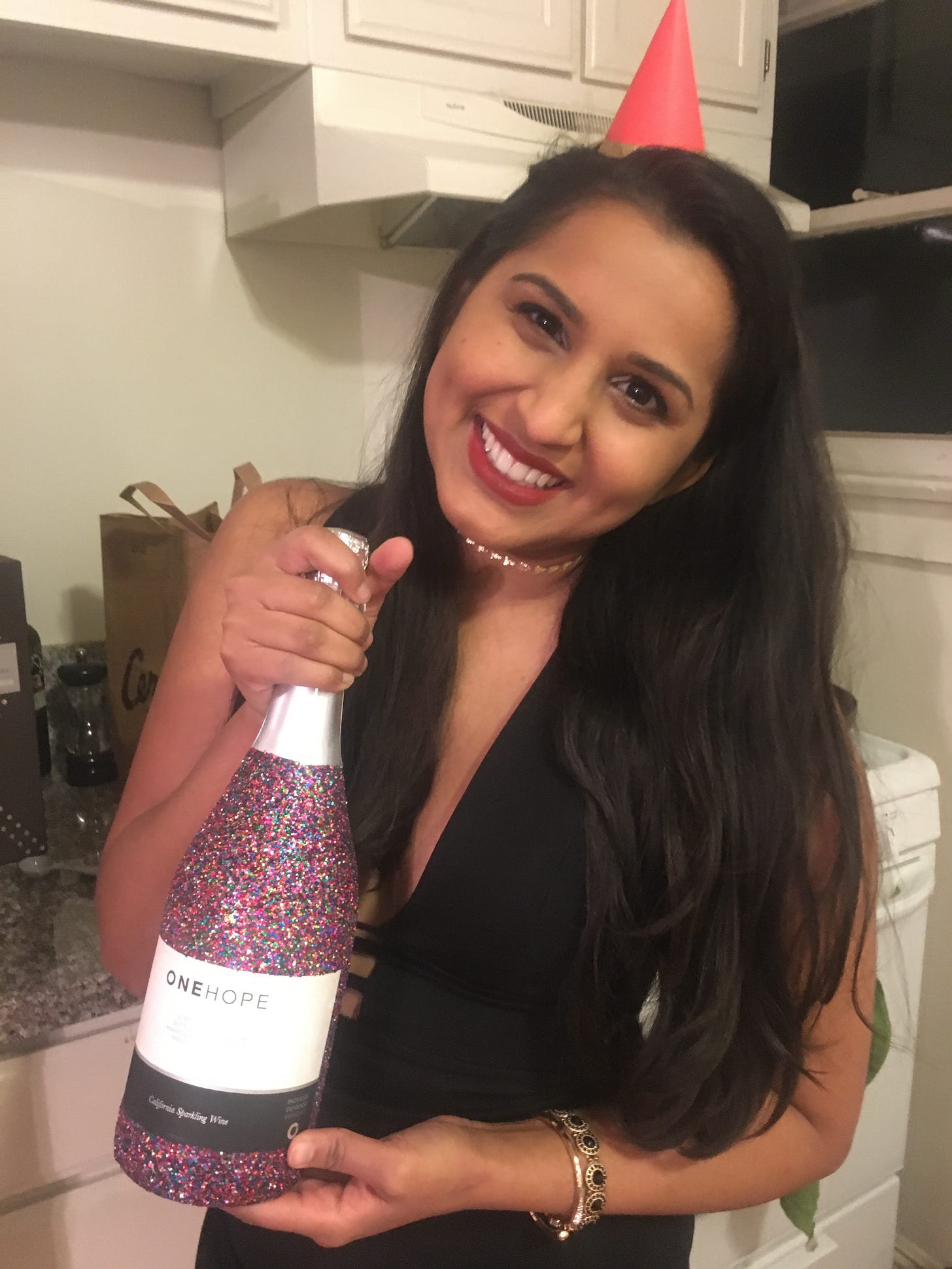Quitting Drinking
Saying Bye to Alcohol
On a hot summer day in Austin, my coworker invited me to chill with her and a couple people from work on her rooftop. I brought over a bottle of red wine and alternated between that and cans of mango White Claws as we chatted on her roof.
My memories end there.
The next morning I woke up, body exhausted from vomiting and dehydration. My brain filled with anxiety and shame as I pieced together the night before. The only thing I could remember was laying on her cold bathroom floor after throwing up everywhere.
The blacked out nights turned anxious mornings were not new to me.
But this day was special.
It was the day I stopped drinking.
Drinking Begins
I always knew I was going to drink. Growing up, dark liquors and fruity wines were a staple at our large family parties in Michigan. My uncles would drink whiskey on the rocks while they played cards in the den. My aunts would sip on cheap wine while they cooked and gossiped in the kitchen. We always had an assortment of liquor in our cabinets. My parents never encouraged nor discouraged drinking. We didn’t talk about it. We didn’t have to. It was part of our culture.
The first time I blacked out was when my college roommate threw me a surprise 21st birthday party. I didn’t remember leaving the apartment after my party, yet I woke up the next morning in the same yellow top and black skirt from the night before. My tights were ripped at the knees, stuck to my skin with dried blood. My roommate gave me the rundown. Apparently, I had jumped from some stairs and landed on my knees. One of many ridiculous things I did that night. I was surprised that nothing she said triggered a memory.
Drinking As An Adult
My drinking habits didn’t change that much when I left college and started working. In San Francisco, I had classy events to replace the crowded house parties. My sister and I invested in a wine club membership so that we could take anyone visiting up to Sonoma. I’d get buzzed at happy hours at my office and let the gentle shaking of Caltrain put me to sleep on my way home. My friends and I would pre game at my apartment before going dancing in some crowded bar with a DJ. I’d explore new neighborhoods in the city with some guy I met on Bumble, losing count of drinks as we went from bar to bar.
Sometimes I’d be fine. Sometimes I’d get sick. Sometimes I’d black out.
As each year passed, I started to feel uneasy about my drinking habits. It was too easy for me to go from two drinks to too drunk. Getting sick and blacking out were bad enough, but I’d also pull some embarrassing antics and have been cut off by bartenders many times.
Stories about getting too drunk were maybe funny and cute in college but as the years went by, I felt like I was the only one of my friends that was still overdoing it.
At some point, each of my friends had taken care of me after a night out. I started getting nervous that I was falling asleep in so many of my Ubers and forgetting the car ride home. I started to lose things. I left my whole purse at a bar once and had to get my credit cards and drivers license replaced. Another time, my iPhone was stolen straight from my bag.
Going out started to feel like a gamble. I never seemed to predict when I would get too drunk.
On top of all that, I started to wonder if I even liked drinking.
Dehydrated the day after, stomach churning, tired all week, the after effects of drinking were clearly negative even if I didn’t throw up or black out. I realized I enjoyed being drunk for about 10 minutes before the buzz turned into slow thinking, slurred words and sometimes sloppy nights.
Still, quitting drinking felt like an extreme option in a culture where drinking has always been glorified. I didn’t even consider it.
I tried moderation first. I made rules for myself like limiting myself to only two drinks. The problem is, one drink never felt like enough and at two drinks, I lost my ability to make a good decision. If I was with someone who was enthusiastic enough to go for a third, I would join. A lot of times I’d even be that person egging someone on to keep the night going.
My hype woman energy can be a dangerous combo with drinking.
Occasionally, I’d commit to not drinking for the night because I found it easier to abstain than to moderate. I’d sign up for early morning Soul Cycle classes so I had an expensive excuse to stay sober.
Unintentionally, I started to practice socializing at events without the help of booze. As a naturally friendly person, I saw that staying sober didn’t prevent me from having good conversations or meeting new people. I always felt good the next morning, having slept well and experiencing zero hangover.
Drinking Ends
I tried to moderate my drinking for about two years.
Even though I felt like my drinking was a problem and that many of my friends had taken care of me while I was drunk, none of them encouraged me to stop. On the contrary, I’d often hear complaints if I cut myself off after one or two drinks.
Trying to control my drinking while battling the social pressure to drink was difficult for me. I’d alternate good and bad months. Still, I saw the only option as counting my drinks, not fully quitting. At the time, I didn’t see any examples of people opting out of drinking culture.
My move to Austin was a few months before the COVID pandemic and worldwide lockdowns. My drinking significantly slowed down because there wasn’t much to do. I lived by myself and didn’t want to pick up a habit of drinking alone.
During this time, I went down a rabbit hole of comedian Nikki Glaser’s content and heard her mention in an interview that she had quit drinking a few years back. It was the first time I heard of someone recognizing their unhealthy relationship with drinking and simply choosing to quit.
Googling this, I found a clip of Nikki saying she read Allen Carr's The Easy Way to Control Alcohol and after that, never drank again. Inspired, I bought the audiobook, knowing I wasn’t ready yet but sensing I would be soon.
That day came the morning after I got too drunk at my coworkers apartment. When I rolled out of bed, I knew I was done with the familiar feeling of hangover mixed with the embarrassment of overdoing it in front of my peers.
I pulled up Audible on my iPhone, put in my AirPods and hit play on Carr’s book. The soothing voice of the narrator filled my ears and I cleaned my apartment as I listened to the whole book.
I liked Allen Carr’s approach because he systematically argued against every possible excuse to keep drinking. He highlighted how ridiculous it is that society normalizes putting something so poisonous into our bodies. Every argument helped dismantle the programming I had around drinking culture.
I can’t tell you if Carr was so persuasive or if the timing was right for me. Either way, I was convinced. Quitting drinking is one of the best decisions I’ve made in my life.
That was in May 2020, I haven’t had a drink since.





Such an honest and authentic story. It seems to me that your willingness to talk about this so openly is the real act of renunciation, giving up the cultural habit of pretending, hiding and masking our true selves. Alcohol is just a symptom of that more poisonous cultural habit.
Beautifully written. When the time is right the moment finds you.
Parts also stood out that remind me of Guard Rail decision making: it is easier for others to accept "I don't drink (on weekdays)" than "I limit myself to two".